Boonex Dolphin.Pro Review
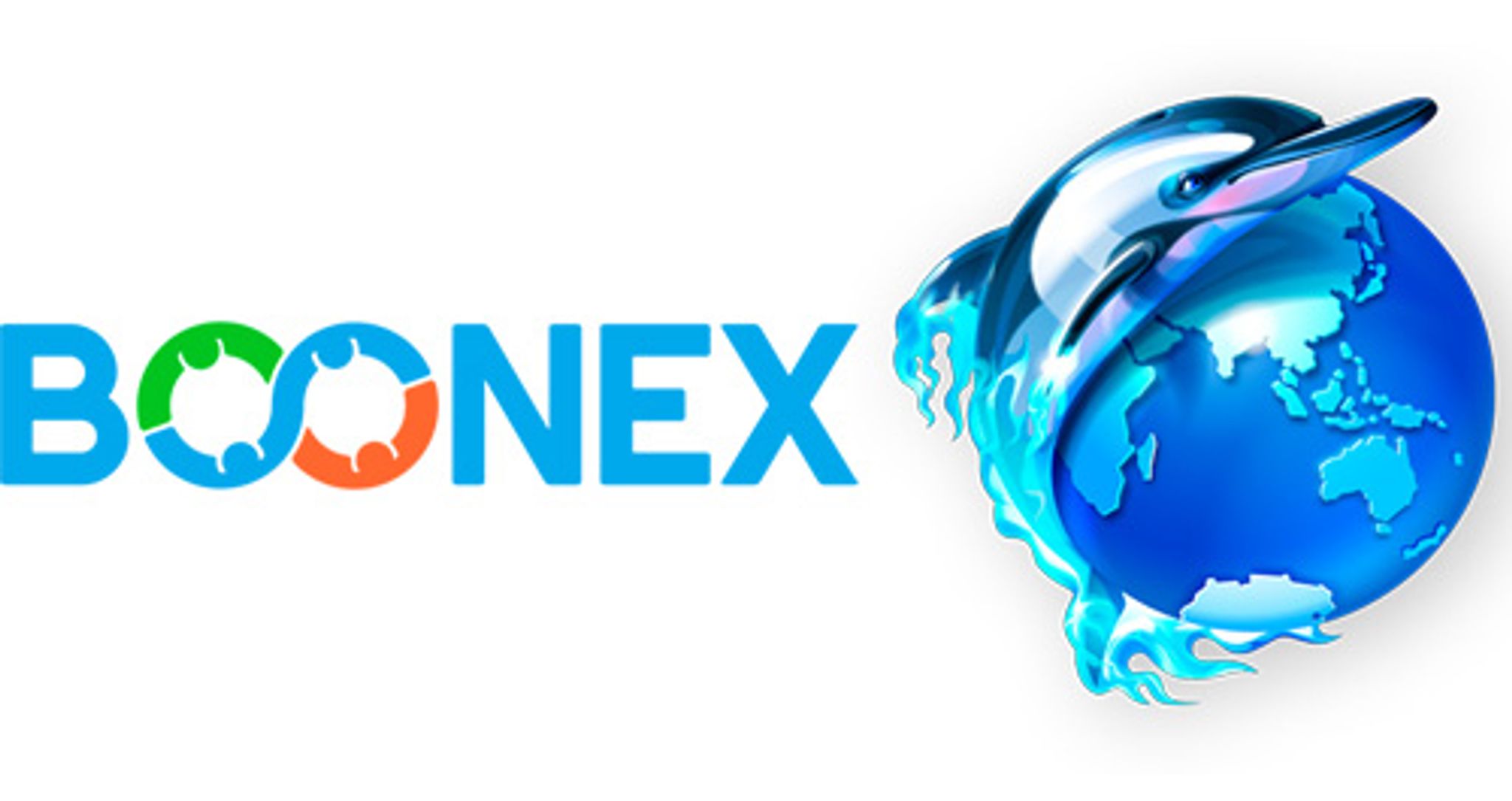
Boonex Dolphin has been on the online community building scene for a while. Since 2001, to be exact.
Today, via it's flagship open source product Dolphin.Pro, Boonex powers over 150,000 social networking websites, providing all the features needed for a community to come together, communicate, collaborate, share experiences, and more.
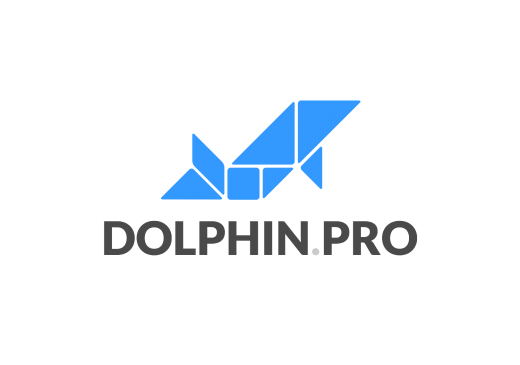
Dolphin.Pro can be used in a self-hosted environment, or users can take advantage of Boonex's hosted solution with automatic backups, automatic installation and assisted updates.
I’ve made it no secret in the past that the social networking space is lacking in quality content management systems, especially when compared to, say, the eCommerce industry.
Is Boonex Dolphin.Pro an exception? Let’s find out.
First Impressions
Their website is impressive, which is always a good sign.
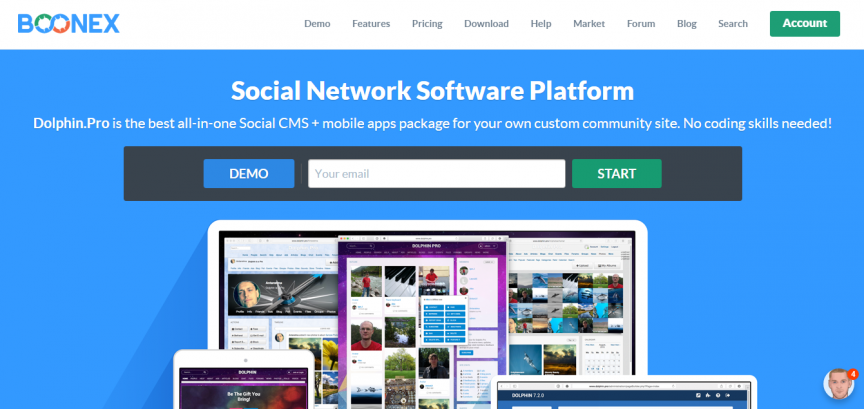
Examples of finished websites are presented well, as are the platform’s features and price plans. It’s all very sleek and professional.
It's easy to find out about the ins and outs of the product, and it's easy to jump right into the demo, too.
Getting Started
I was making use of the extensive demo that Boonex offers, which gives you a good impression of what Dolphin.Pro is capable of right off the bat.
The demo showcases a fully fledged Dolphin.Pro powered website. It looks good, and all the trimmings work very, very well. The sleekness certainly carries over into the end product, that's for sure.
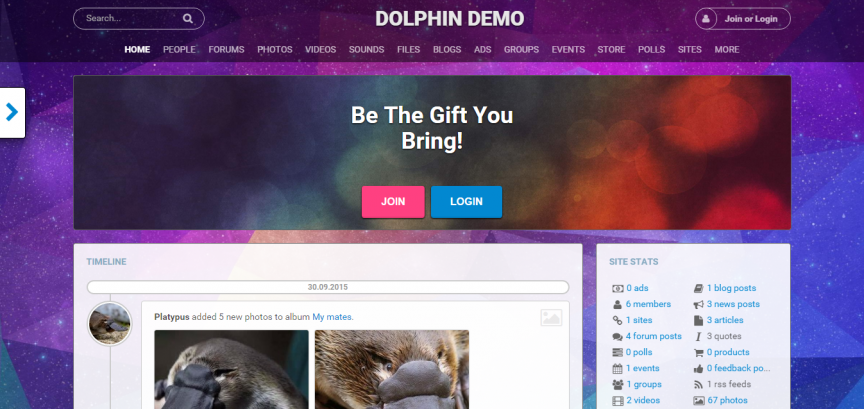
Moving to the back end, which is the more important bit, things looked a little less spectacular.
Don't get me wrong, I like the simplicity of it, but I think it could use a bit of sprucing up.
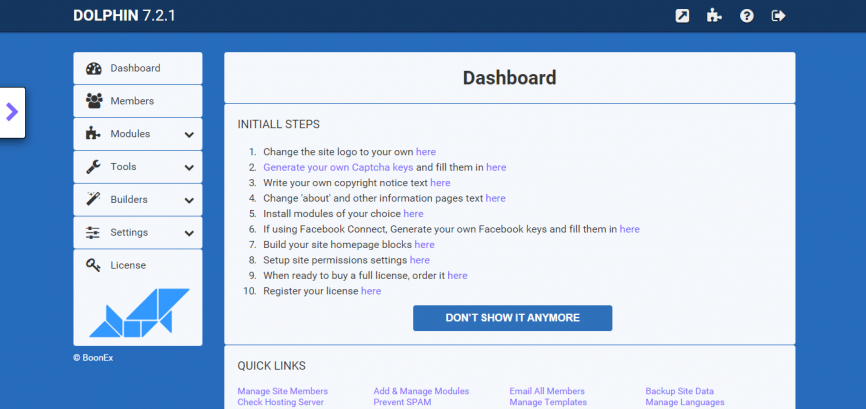
The “Initial Steps” (which is misspelt as “Initiall”) window is helpful, as it sets out ten things which the user will need to do in order to launch their community.
But it feels a little rigid. Perhaps if the list updated as you carried out each step, to give the user a sense of progression. Plus, I felt the “DONT SHOW IT ANYMORE” button was a little in your face. A “Close Initial Steps” button would suffice.
It's little things like that which make the difference between an enjoyable experience and an average one. Especially when those little things are the first thing a new user sees.
Further down the dashboard, I found some analytical data in the form of graphs and charts. You can toggle between a long list of measurables, including members, subscribers, messages, files, shoutbox messages, photos, transactions and more.
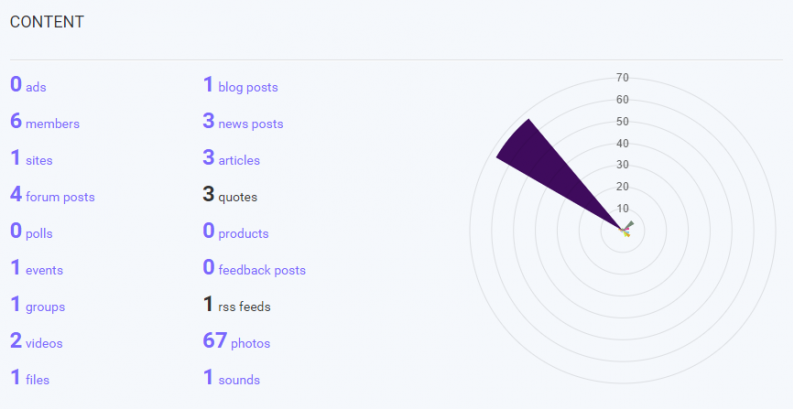
But the ones you'd expect to find, like, visitors, page views, interactions, and so forth, are nowhere to be found. I thought that was odd.
Even further down the page was the Boonex News Feed, followed by a short list of featured modules. Nothing wrong with having that stuff on display, but perhaps the sidebar is a better location for it all.
Members
First up on the side menu, is Members.
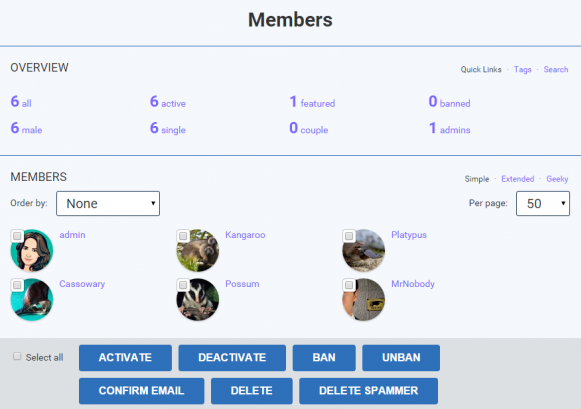
This section gives you some stats relating to your members, tags used, and also gives you a search option. However, to get to the search function, you need to click on a button. Again, the sidebar would make more sense.
And of course, you can see all of your community members listed.
You can order them by username, join date and last activity. Plus, there are three display options to help you find out more about each member; simple, extended and geeky.
You can select a member or a group of members, and choose from options which include; activate, deactivate, ban, unban and confirm email.
Modules
The Modules section handles all of the core features of Dolphin.Pro. And there are a lot of them.
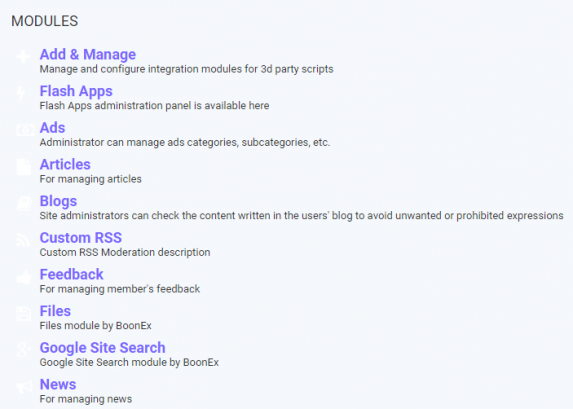
Ads, articles, blog posts, RSS, photos, videos, audio, store, forum, timeline, world map, simple messenger, Facebook connect, polls, groups, events, online desktops, page access control and much more.
There really is a wealth of features to help piece together your online community. Kudos to Boonex, I'm impressed.
I tinkered with many of them, and they were pretty straight forward in terms of set up. However, I noticed once again that the back end design was lacking slightly.
There are no menus or tabs to organize the inner-workings of these modules. Like the dashboard, you'll need to scroll down the page in order to access different settings. This, paired with the fact that text and page elements seem to be quite large on the Dolphin.Pro admin panel, makes for a cumbersome experience.
Clicking “Add + Manage” enables you to update installed modules, see featured uninstalled modules and upload module packages from your computer.
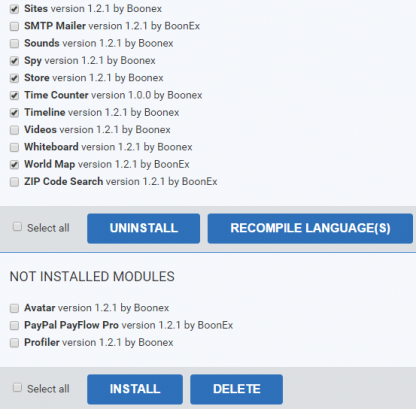
Here are a few select modules which are worth talking about.
eCommerce
Dolphin.Pro lets you sell stuff.
Under the Modules section in the back end, is the option to add products and configure some settings to do with product listings and sales.
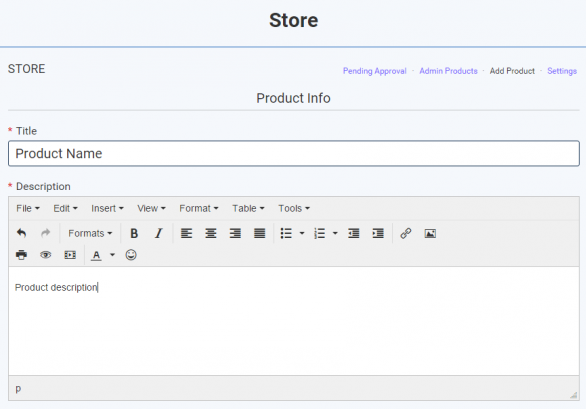
You can also add tags, categories, restrict it to be seen only by members, and so forth. It's not going to compete with any actual eCommerce platforms, but it's a nice integrated option to have.
Timeline
The timeline is the lifeblood of any online community.
The timeline module lets you configure all the settings to do with the timelines in your community. That includes the ones on the homepage, profile pages, and elsewhere.
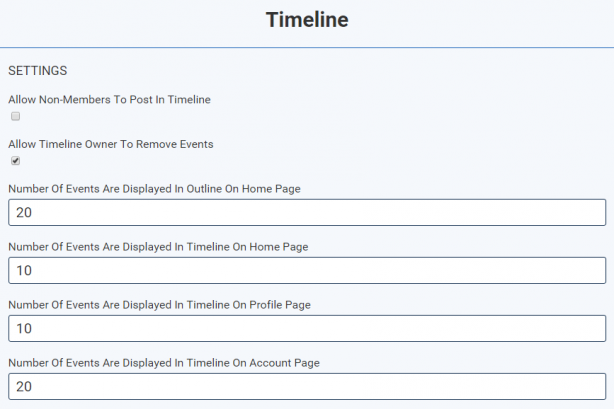
You can configure the amount of events that are displayed, maximum number of characters in a text post, hide and show particular events, and so on.
Flash Apps
The Flash Apps section offers up a set of additional features, including; messenger, desktop, music player, video player, whiteboard, and more.
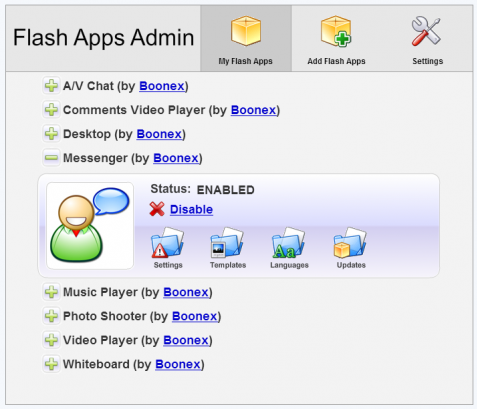
I'm not sure why these features aren't just includes with the rest of the modules, but nevertheless, they each have their settings which are easy enough to configure. That includes enabling and disabling them, setting refresh times, and so forth.
Once again, there's a lot to choose from, and there are a lot of settings as a result. But they are quite easy to adjust. Plus, it's another show of just how feature-rich Dolphin.Pro is.
Tools
The Tools section encompasses some of the extra features offered out of the box by Dolphin.Pro.
This includes; mass mailing, banners, IP blacklists, database backups, anti-spam tools, caching and sitemaps.
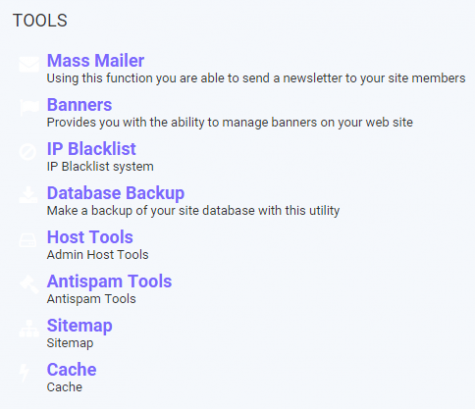
All of the features seemed to work well, with arguably the most important one, the mass mailer, being very simple to use.
It lets you write up your email with a rich text editor, manage subscribers, and set the amount of emails that should be sent out at configurable intervals. The only thing it's missing is the option to import subscribers.
The rest of the features worked exactly as you would expect them to. Which is a good sign.
Builders
The Builders section lets you handle menus. All the menus. Everywhere.
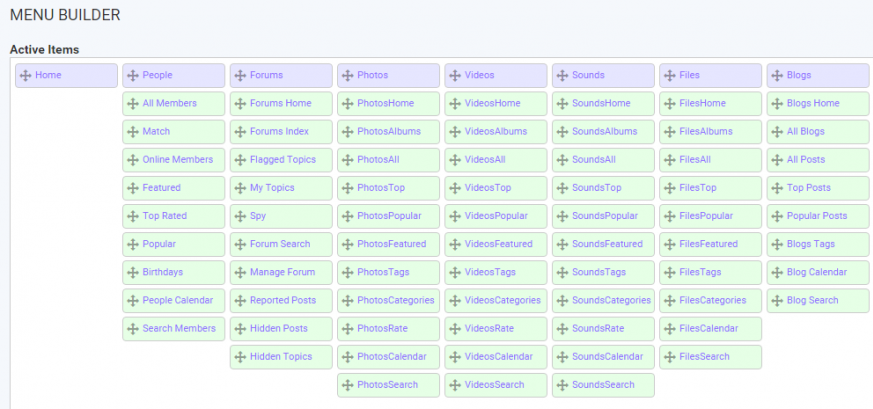
Navigation menus, admin menus, mobile pages, profile fields, and more. Menu options come in the form of blocks which can be dragged and dropped into position. Menus display in such a way to help the user visualize them as they would appear on the front end.
Inactive blocks are displayed below, where they can be selected and dragged into place.
It's not exciting, but it's an effective interface.
Page Builder
The page builder is as essential as it sounds. You'll need it to build your pages.
Thankfully, Dolphin.Pro does a pretty good job of making it easy. It has a similar interface to the menu builder, allowing you to drag and drop elements into place.
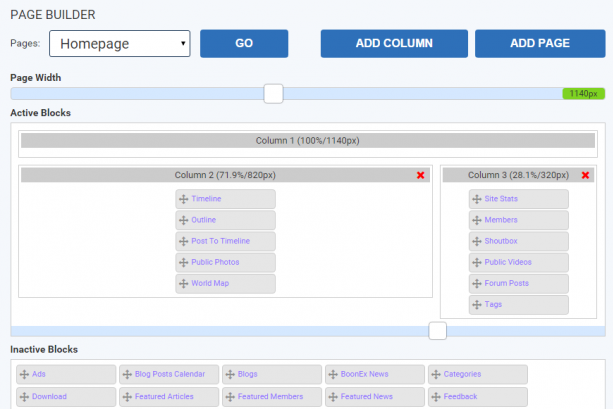
Such elements include ads, world maps, forum posts, blogs, and all the other modules offered up by Dolphin.Pro. You can also adjust the width of each page to allow for more modules if you so wish.
It's not a visual WYSIWYG builder, which would be nice, but it is a visual representation of how things will look. It's a halfway house, and that's acceptable.
It's also very responsive and easy to use. No complaints from me here.
Settings
The settings section handles the more technical side of things. It's the less exciting bit, yet holds all of the most important information about your community.
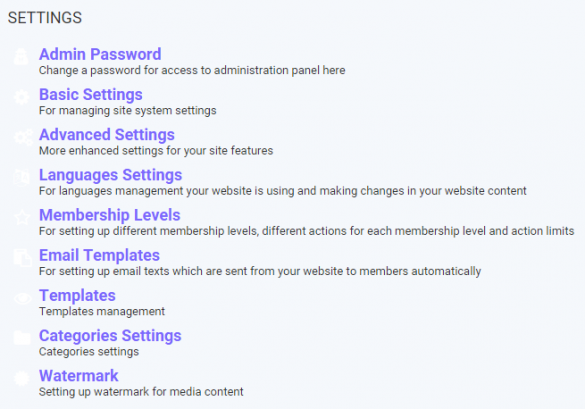
That includes admin passwords, membership levels, language settings, email templates for mass mailing, website templates and more.
Some basic settings include uploading and resizing a logo, setting a site title, configuring permalinks,
Apps & Extras
As for extras, Boonex Dolphin.Pro has a few.
Market
The marketplace for example, is home to templates, modules, integrations, language packs and more.

There are over 3,200 products to choose from, and I suppose the quality is about the same as you can expect from any third-party plugin marketplace. It's not always going to be of the highest quality, but it makes up for it by providing a whole lot of extra functionality.
All one can ask for is a wide range of options, and that's exactly what's on offer.
Templates
When it comes to templates, Dolphin.Pro is a little disappointing.
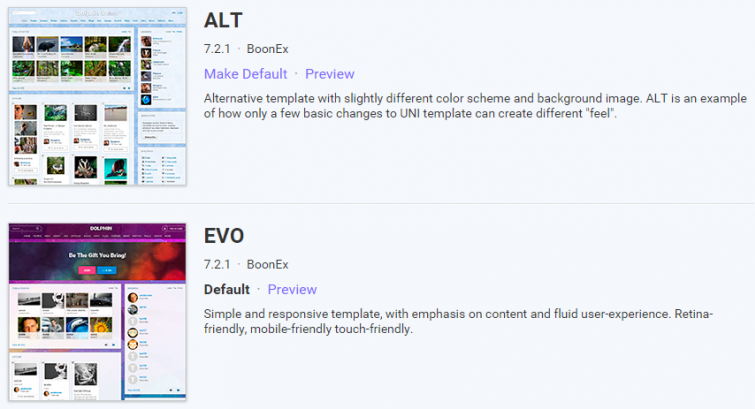
You can choose between three bundled templates from the back end, before having to go to the market and purchase more.
But the market only gives you seven more templates to choose from, none of which are free. Ten templates, most of which require payment, is quite poor. The only up side is that the bundled templates are of a high quality.
iOS & Android Apps
Dolphin.Pro users also get to make use of native iOS and Android apps to give community members another way of interacting with the community.
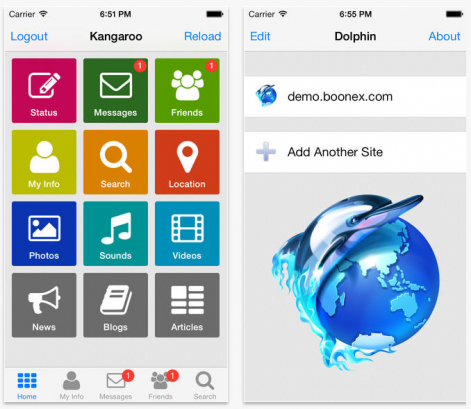
The app lets administrators manage their communities and add multiple sites to be handled from the same app. Registered members can also add sites and participate in the community from the comfort of their iPhone, iPad or Android device.
Getting Help
For help and support, Boonex offers a busy forum, detailed documentation, and an email address. But that’s pretty much it.
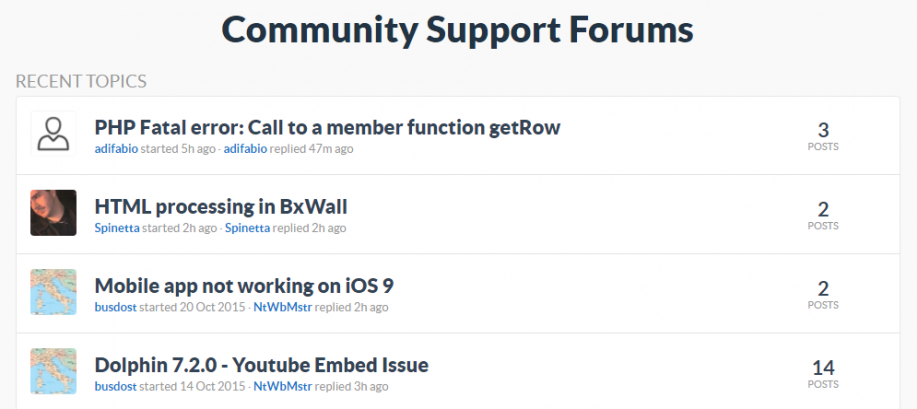
The forum is a good resource, with a lot of users asking and answering questions. As for the documentation, everything from the beginners guide to the Development FAQ is written about at length.
But if you exhaust those two support options, Boonex only provides a simple email address for you to reach out to them on. There’s no searchable FAQ hub, no ticketing system, and no live chat.
For me, all of those missing support options need to be there for a product that’s so widely used.
Pricing
Boonex Dolphin isn’t the cheapest product on the market. And many would argue that that’s justified.
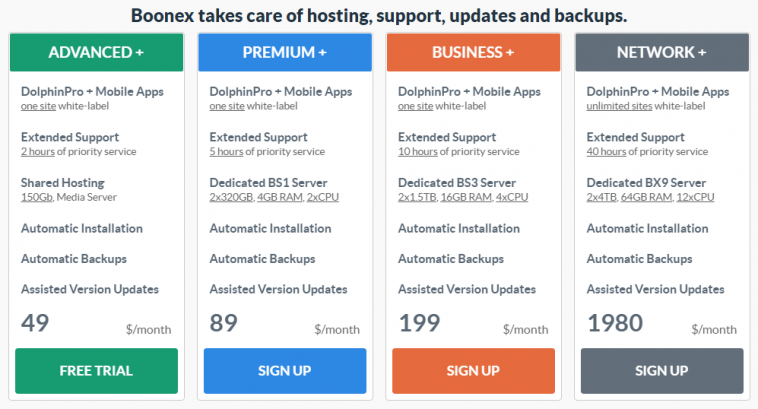
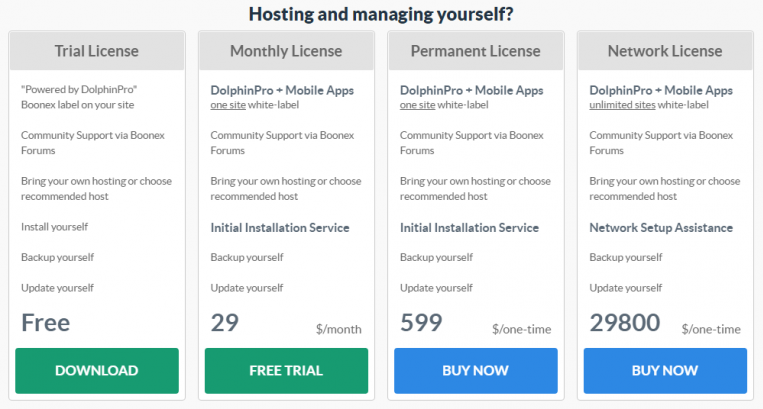
The lowest plan starts at $49 per month for a hosted solution, and $29 per month for a self-hosted solution. Pricing doesn't stop there, though.
Dolphin.Pro is equipped to handle large scale projects thanks to its massive set of features, and thus, pricing is offered to reflect that. We're talking $1,980 per month for the network license with unlimited sites, bigger servers and extended dedicated support hours, to a $29,800 one-time fee to buy the network license outright.
PHPfox offer their Neutron platform for a one-off fee of $348, which works out to $29 per month for a year, self-hosted. SocialEngine Cloud also comes in at $29 per month, which included hosting.
The Verdict
I like Dolphin.Pro. The more I used it, the more it grew on me.
The backend isn't going to win any beauty contests, but it's easy to navigate, very responsive, and it's rammed full of features that are relatively easy to configure.
The Boonex market is also well populated, with a number of modules, integrations and more. Together with the long list of features that come out of the box, Dolphin.Pro is a seriously powerful platform.
It's not the cheapest option out there, but there's no doubting that Dolphin.Pro is one of the leading products in online community builder market. It's not perfect, but I don't see many other platforms matching it.
Pros
- Boonex Dolphin.Pro is capable of building a genuinely beautiful online community.
- Feature galore; including; ads, blogs, payments, eCommerce, Chat, events, forums, memberships, polls, groups, page access control, and a whole lot more.
- The user interface is a bit dated and clunky, but it's also simple and well functioning.
- The Market offers a fair amount of modules, integrations and language packs.
- A busy community is always a good thing, and Dolphin.Pro has one in the form of a discussion forum.
- Native iOS & Android apps.
Cons
- Support options are limited.
- The backend could do with a re-design.
- Not enough templates.
Final Remarks
The sleekness that Dolphin.Pro can offer from its bundled templates is enough to sway you.
The backend needs some work, but it's neat and tidy for the most part, and there's nothing I can criticize when it comes to the quantity and quality of features.
As I mentioned earlier, I have my concerns over the lack of stellar community builders on the market, and I think now is a good time to reiterate that. When compared to, say, the eCommerce industry, the quality of products on offer for building social networks is nothing short of disappointing.
Boonex Dolphin.Pro though, is one of the few platforms that are holding their own. It's powerful, it has a broad community behind it, and it's capable of being beautiful.
All in all, it's a thumbs up from me.